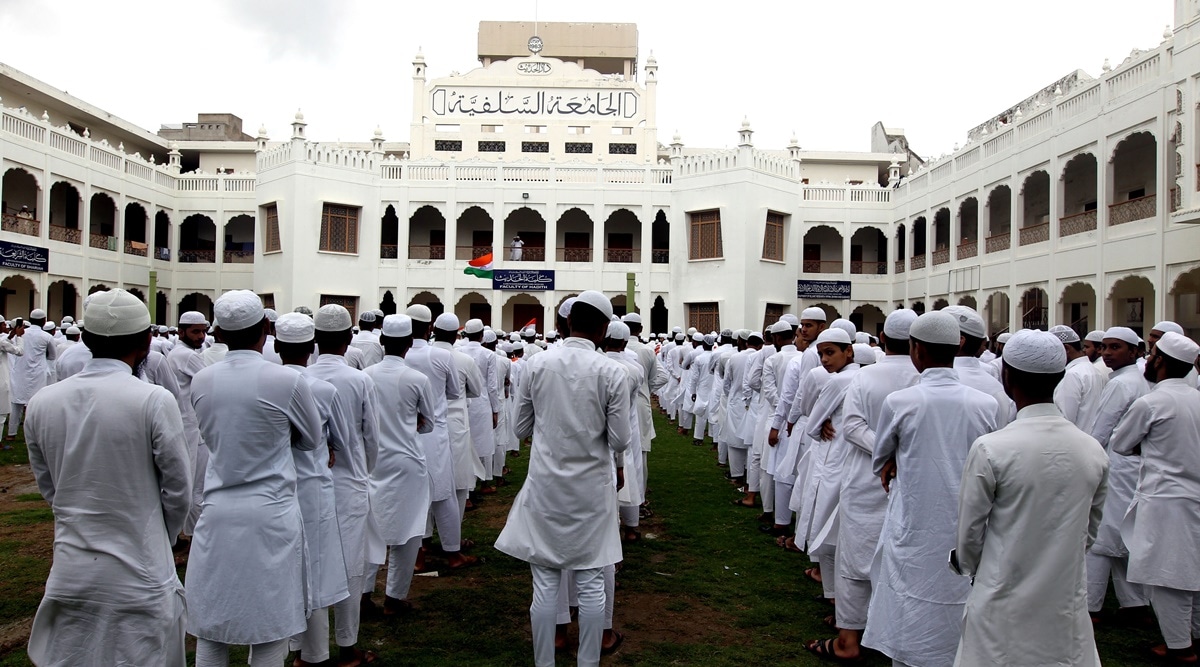 Hindutva politics has reduced the UCC to being yet another stick to be wielded against minorities. (Express photo by Anand Singh/Representational)
Hindutva politics has reduced the UCC to being yet another stick to be wielded against minorities. (Express photo by Anand Singh/Representational)Not long before the dates for the assembly elections were declared, Gujarat became the latest BJP-ruled state to announce the government’s intention of bringing in a Uniform Civil Code (UCC). Undoubtedly, gender justice remains elusive for Indian women 75 years after Independence. But is the UCC talk in vogue today really about gender justice and equality? A prominent BJP member in Gujarat hailed the UCC announcement as the fulfilment of one of the BJP manifesto’s most cherished goals. Hindutva politics has reduced the UCC to being yet another stick to be wielded against minorities. It is a deeply politicised idea, which emphasises an unthinking and coercive uniformity sans any concern for gender justice. Ironically, a government that granted remission to the rapists of Bilkis Bano wants to bring in the UCC.
Jawaharlal Nehru and B R Ambedkar championed the UCC out of genuine concerns related to justice and equality for female citizens. They faced outright opposition within the Constituent Assembly as well as in civil society. Hindu Mahasabha luminaries, traditionalist Congressmen and Muslim leaders united to protect misogynist personal laws, ostensibly based on religious texts and identities. The idea of a secular law or UCC was perceived as a direct onslaught on our Hindu civilisation as well as a threat to the identity of religious minorities. Nehru was forced to abandon the plan to the disappointment of the All India Women’s Conference and Ambedkar. Patriarchy masquerading as religion rejected the idea of secular family laws. Finally, the UCC was included as Article 44, part of the Directive Principles.
It was due to Nehru’s remarkable statesmanship, backed by Ambedkar’s erudition, that the Hindu Code Bills were eventually introduced in Parliament from 1955-56. This led to massive reform in the following years. Several Hindu family laws governing marriage, divorce, guardianship, succession, and property ownership were enacted even as opposition from some quarters persisted. Women began benefiting from the laws. Divorce became possible despite Hindu marriage being a sacrament, as did a share in property for women. There have been reforms wherein Christian women can obtain divorce under the Indian Divorce Act. Gradually, justice in the family became a reality for Indian women — Muslim Personal Law has been a glaring exception. Muslim women were left out of the ambit of legal safeguards owing to the resistance to reform by the conservative clergy. Muslims are governed by the Muslim Personal Law (Shariat) Application Act of 1937 which is silent on important aspects such as age of marriage, consent, meher, divorce procedure, polygamy, custody and guardianship of children and women’s share in property.
Although the enactment of a nationwide UCC would mean changes in the law for all Indians irrespective of religion, the popular narrative presents it as a Muslim problem. This is largely thanks to the absence of codified Muslim family laws and the general resistance to reform within dominant sections of the community. The conservatives would forever stonewall reforms in personal law in the name of protecting Shariat and the BJP-RSS would keep raising the demand of UCC. Meantime, Muslim women would continue being denied legal protections available to sisters from Hindu, Christian and Parsi backgrounds.
Despite the consistent political posturing by BJP functionaries, there is no hint of what a UCC in present-day India would look like. Undoubtedly, justice and equality for all citizens of all genders must be the raison d’etre of any such exercise.
There is no discourse about how to make it an inclusive plan that draws on the best practices of all religions and simultaneously retains the diversity of practices. Affirmative provisions such as consent and meher (although they are both violated in practice) in Muslim marriages are such examples. In its report, the 21st Law Commission of India stated that a UCC across India is neither feasible nor desirable.
Looking beyond politics, a sort of common secular law already exists in our country. The Special Marriage Act, of 1954 is a precursor to the UCC. It needs to be rehauled thoroughly and made comprehensive to include all aspects of marriage and family. Provisions such as the 30-day notice by couples intending to marry should be dropped. If enacted, some of these changes could render so-called “love jihad” laws ineffective. This law must be amended and strengthened to translate gender justice principles of the Constitution into reality. And most importantly, the Special Marriage Act must be popularised by the government for ordinary persons to register their marriages under this law.
All citizens, especially marginalised sections such as women, are entitled to comprehensive legal protection in a secular democracy. We need to place gender equality at the centre of the UCC debate in order to eradicate discriminatory practices. Uniformity in itself is pointless.
Modernisation and progress in society must be aided by a just and fair legal architecture. Those in power must appreciate that gender equality is India’s goal and goes way beyond the agenda of the political party they represent. The Modi government can learn from the first elected government of independent India. It can learn how Nehru and his government kept its commitment alive through incessant iteration, dialogue, discussions and inclusion of all voices from different sections. It took many years for Nehru to build a conducive climate for acceptance of the Hindu Code Bills. Gender equality is too important a goal to be sacrificed at the altar of electoral politics or communal ideologies.
The writer is a founding member of Bharatiya Muslim Mahila Andolan